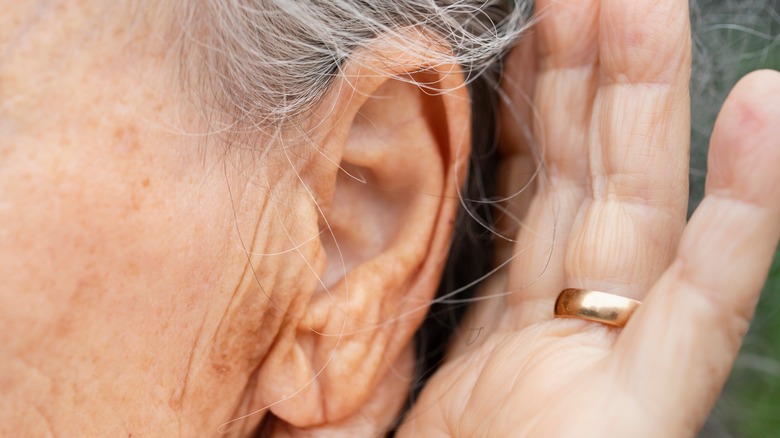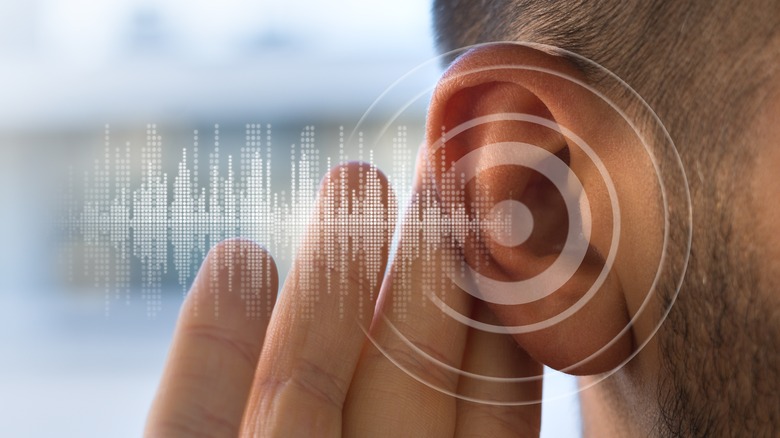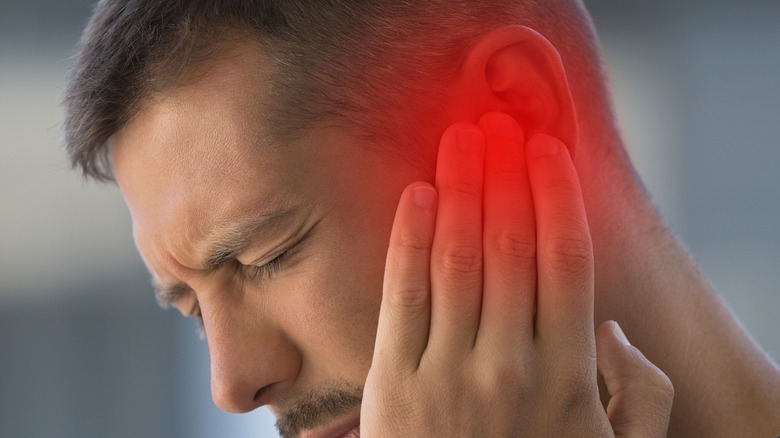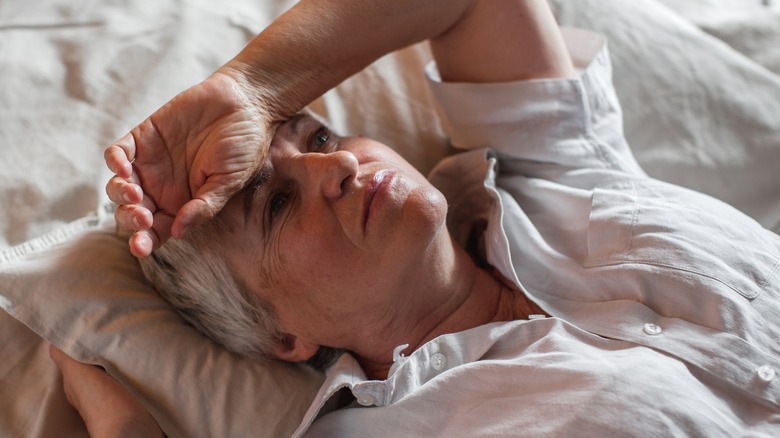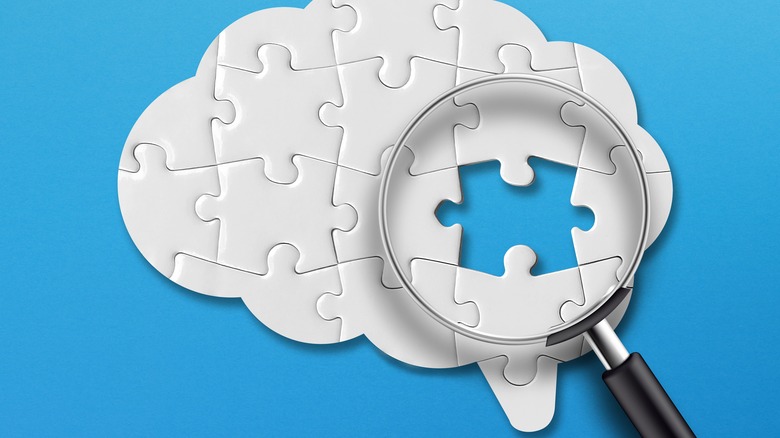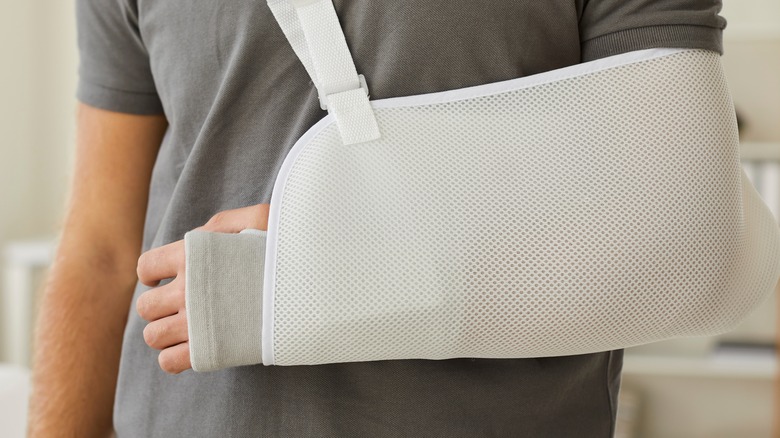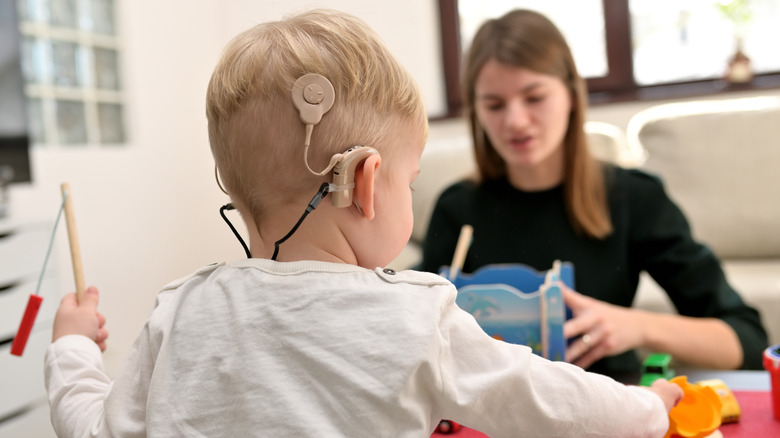The Side Effects Of Losing Your Sense Of Hearing
Hearing loss is a relatively common problem. The National Institute on Deafness and Other Communication Disorders (NIDCD) estimates that, based on "standard hearing examinations," about 13% of Americans over age 12 have some hearing loss in both ears, though the percentage gets higher as people get older. As WebMD explains, age-related hearing loss is not reversible, but it can be improved with hearing aids. The NIDCD says hearing loss that can be improved by hearing aids is referred to as "disabling" hearing loss, but only about 30% of adults over age 70 with disabling hearing loss have actually tried hearing aids.
Unfortunately, when disabling hearing loss isn't treated with hearing aids (or any other treatment), it can interfere with daily life in many ways. The Mayo Clinic explains that some of the primary symptoms of hearing loss include conversational withdrawal and avoiding social settings, both of which can lead to social isolation. Moreover, because age-related hearing loss happens very gradually, it may not be noticeable for a while. The Mayo Clinic recommends talking to your doctor immediately if and when you notice any hearing loss in one or both ears, but especially if you only notice it in one ear. Read on to learn more about hearing loss and some of the unexpected side effects of losing your sense of hearing.
Common causes of hearing loss
According to the Mayo Clinic, some of the main factors that contribute to the development of hearing loss are age and regular exposure to very loud noises. In both cases, the ensuing hearing loss is not reversible. The National Institute on Deafness and Other Communication Disorders (NIDCD) says age is the best predictor of hearing loss. In fact, the Mayo Clinic estimates that almost half of Americans age 65 or older have at least some hearing loss. But other factors can contribute to hearing loss as well.
For instance, WebMD says that earwax buildup can contribute to hearing loss, but this kind of hearing loss is easily reversible: The ears simply need to be thoroughly cleaned. This needs to be done carefully, though. While many people turn to cotton swabs to try to get the excess earwax out, this can actually make the problem worse, lodging earwax even deeper into the ears. Instead, experts recommend applying a few drops of baby oil or mineral oil directly into the ears, which can help the earwax come out. There are also drug store products that can be used to soften earwax and make it easier to get it out. Lastly, see a doctor if at-home remedies don't work.
Ear infections can also cause temporary hearing loss, but these typically go away on their own. Antibiotics can help treat more persistent infections and the subsequent hearing loss.
How hearing loss is diagnosed
When hearing loss starts to become noticeable, you may want to get tested. According to the Mayo Clinic, there are a variety of ways to test for hearing loss. One way to diagnose hearing loss is to see a doctor, who will examine your ears to see if anything might be obstructing your hearing (e.g. excess earwax or an infection).
Other methods to diagnose hearing loss involve hearing tests, such as a whisper test. Similar to an eye exam, a whisper test may require you to cover one ear at a time, then listen to noises of different volumes in order to determine how well each ear can identify sounds. Doctors can administer such tests, but you can also download apps to test yourself on your own. Some doctors will use tuning forks to test for hearing loss, which can help identify the location of damage in the ear.
However, none of these tests are very precise. The most precise hearing loss test is called an audiometer test, and it needs to be administered by an audiologist. During an audiometer test, you'll put on a pair of headphones and listen to sounds and words directed into one ear at a time, and these sounds will get quieter and quieter in order to determine the quietest possible sounds you can hear in each ear.
Hearing loss is separate from tinnitus, but the two are related
When learning about hearing loss, it's also common to come across information about tinnitus, though the two conditions are distinct from each other. The Mayo Clinic described tinnitus as a ringing sensation in one or both ears. They estimate that up to 20% of adults are affected by this problem, but it's even more common in older adults.
A variety of factors can contribute to tinnitus, such as circulatory problems, ear injuries, infections, or exposure to loud noises. WebMD says the condition is sometimes reversible, and it may go away on its own. When tinnitus happens as the result of a medical condition, treating the condition is the best way to treat the ensuing tinnitus. Tinnitus can also be treated with hearing aids, medications, masking devices (hearing aid-like devices that play sounds to cover up the tinnitus), cochlear implants, relaxation techniques, and a variety of different types of therapy.
While tinnitus is not the same as hearing loss, the two are related. In some cases, both hearing loss and tinnitus may be caused by the same underlying condition, such as an infection. Hearing loss can also lead to tinnitus. Another article from WebMD says tinnitus is often an early symptom of hearing loss. That said, tinnitus doesn't cause hearing loss, according to the Mayo Clinic. It may make hearing more difficult, but it won't permanently damage your hearing by itself.
Hearing loss is associated with social isolation
Some of the most common symptoms of hearing loss are withdrawal from conversations and social avoidance, according to the Mayo Clinic. This makes sense: When you're experiencing hearing loss, it may seem easier to avoid conversations and certain social settings rather than continually having to ask people to repeat themselves or worry that you're mishearing others. While understandable, these withdrawal behaviors can unfortunately lead to social isolation.
A 2014 study from Otolaryngology—Head and Neck Surgery found this effect was most pronounced in women in their 60s who were experiencing hearing loss. This study examined survey data from adults experiencing hearing loss from ages 60 to 84, and the researchers found that women from ages 60 to 69 were the only group whose hearing loss was significantly associated with social isolation.
A more recent 2020 systematic review from Otolaryngology—Head and Neck Surgery that analyzed 14 studies on hearing loss and social isolation found hearing loss to be associated with a greater risk of social isolation and loneliness, though several of these studies found the risk greater in women than in men.
Depression and hearing loss
One of the most common side effects of hearing loss is depression. One potential reason for this is social isolation. The Mayo Clinic says hearing loss can cause people to withdraw from conversations or avoid certain social settings, both of which could lead to social isolation. And as WebMD explains, social isolation can contribute to depression.
A systematic review and meta-analysis from Trends in Hearing says depression is one of the more common symptoms of hearing loss. Thankfully, it is treatable, particularly when the hearing loss itself is treated. For instance, Internet-based interventions that help educate and treat people dealing with hearing loss have been found to alleviate depression. Internet-based interventions to educate and treat tinnitus have also been found to reduce depression. While tinnitus isn't the same as hearing loss, the two are related to each other. In fact, the Mayo Clinic says tinnitus is often caused by hearing loss.
If you or someone you know needs help with mental health, please contact the Crisis Text Line by texting HOME to 741741, call the National Alliance on Mental Illness helpline at 1-800-950-NAMI (6264), or visit the National Institute of Mental Health website.
Hearing loss is associated with anxiety
Hearing loss can also contribute to anxiety. A systematic review and meta-analysis from Trends in Hearing identifies anxiety as one of the main side effects of hearing loss.
An article from the Hearing Journal explains that anxiety is often exacerbated by hearing loss. As hearing loss gets worse, anxiety often worsens as well. This article lists many potential scenarios in which hearing loss would contribute to anxiety, such as walking into an unknown office (or being pressured to go into the office) and meeting new people. In such situations, the person experiencing hearing loss might stress out about having to listen to what someone else is saying, particularly someone they don't know, for fear of not being able to understand them. There's also concern that they may not even realize if someone is talking to them.
The review from Trends in Hearing explains that treating hearing loss can often treat the associated symptom of anxiety. Internet-based interventions to educate and treat people with hearing loss have been found to help reduce anxiety among those experiencing hearing loss.
Insomnia and hearing loss
Perhaps somewhat counterintuitively, hearing loss is associated with insomnia. A review from the American Journal of Audiology says hearing loss can disrupt sleep through "reduced auditory input." It might seem like it should be easier to sleep when experiencing hearing loss, since nighttime noise that could otherwise disturb sleep wouldn't be an issue, but the overall "reduced auditory input" may make it more difficult for those with hearing loss to transition from daily activities to sleep.
Another possibility is that the insomnia experienced by those with hearing loss is a secondary symptom, potentially a result of the depression and anxiety that are more directly caused by hearing loss. A study from the Journal of Clinical Sleep Medicine found patients with sudden sensorineural hearing loss (a type of unexplained, rapid hearing loss) were more likely to experience insomnia if they were also experiencing depression, anxiety, tinnitus, or dizziness.
A systematic review and meta-analysis from Trends in Hearing says Internet-based interventions for treating tinnitus have shown promise for treating the insomnia associated with tinnitus. When anxiety or depression from hearing loss are exacerbating insomnia, treating the anxiety or depression can be helpful as well. For instance, Healthline recommends cognitive behavior therapy, relaxation techniques, avoiding stimulant drugs, and a variety of other remedies to treat insomnia caused by anxiety.
Cognitive impairment and decline with hearing loss
Hearing loss is also associated with cognitive decline and impairment. A prospective observational study from JAMA Internal Medicine that followed 1,984 adults for six years found that hearing loss was independently associated with cognitive decline. Additionally, a systematic review from Otolaryngology—Head and Neck Surgery that analyzed 36 studies found that age-related hearing loss was associated with cognitive decline, cognitive impairment, and dementia.
The review from Otolaryngology—Head and Neck Surgery suggests that one potential reason for the association between cognitive decline and hearing loss is common etiology, meaning the same physiological decline that contributes to hearing loss could also contribute to cognitive decline. Another possible explanation is that cognitive decline could happen as a direct result of hearing loss: When it's more difficult to hear and understand others' speech, it may subsequently be harder to maintain the same level of cognitive engagement. The researchers also suggest prolonged depression, another symptom of hearing loss, could independently contribute to cognitive decline through declining attention to the external world.
Hearing loss can interfere with balance
As the Cleveland Clinic explains, your inner ear doesn't just allow you to hear. Its other primary function is to help you keep your sense of balance. As such, hearing loss can interfere with your sense of balance. Doctor Frank Lin of Johns Hopkins Medicine says that your ears normally pick up on a variety of subtle cues in your environment that contribute to your sense of balance as you walk, but hearing loss makes it harder for your ears to do this important job, thus making it more difficult for you to keep your sense of balance.
A controlled trial from the journal Gait and Posture studied the effects of hearing aids on posture among older adults with hearing loss. Half the participants used hearing aids, while the other half didn't. Each participant had their balance tested under four conditions: Eyes either open or closed, and feet standing on either a rigid surface or a foam surface. The participants who used hearing aids were tested both with and without their hearing aids, while the participants who didn't use hearing aids were only tested without them. The researchers found that using hearing aids could improve posture and balance, even when eyes were open. These results suggest hearing loss affects balance, and hearing aids can help.
Hearing loss can increase the risk of environmental injuries
As we've just seen, hearing loss can hinder balance. The Cleveland Clinic says damage to the inner ears and other forms of hearing loss can affect balance. Loss of balance can have many negative consequences, including an increased risk of falling and other environmental injuries. A study from Archives of Internal Medicine says there's a strong association between hearing loss and falls. But loss of balance isn't the only reason for this. The study says a lack of awareness of the noises in one's environment may also explain why falls are more common when experiencing hearing loss. In other words, without the ability to hear well, people may be less aware of potential danger in their environments.
Another study from the International Journal of Advanced Robotic Systems says people who are hearing impaired are "constantly in danger of being hit or knocked down by fast moving objects behind them." This study tested the effects of a vibrating "alarm necklace" for those with hearing loss, and the researchers found this system effective for the purposes of helping those with hearing loss become more aware of moving objects in their environment. While this technology wouldn't necessarily help the hearing impaired improve their balance, it's very promising for the purposes of preventing environmental injuries.
Myths about hearing aids can hinder treatment seeking for hearing loss
As a study from Archives of Internal Medicine says, "Hearing loss is highly prevalent but remains vastly undertreated in older adults." Given the numerous side effects of losing your sense of hearing, this is cause for concern. Treating hearing loss can also treat the associated side effects, such as depression, anxiety, and insomnia (as outlined by a systematic review and meta-analysis from Trends in Hearing).
One of the reasons hearing loss remains largely untreated in adults is that myths about hearing aids may make adults less likely to use them. Johns Hopkins Medicine says only about one in seven adults over the age of 50 with hearing loss have tried hearing aids, and that people who do use hearing aids wait an average of about ten years before seeking help for their hearing loss. Some people may be worried hearing aids will be difficult to use. While it can take time to adjust to hearing aids, what matters is finding the right hearing aids for you, which is why most hearing aids include a trial period. Additionally, some adults may not like the way hearing aids look. However, modern hearing aids are much smaller and sleeker than older, bulkier models. What's more, many popular celebrities use them, helping to dispel the stigma.
Hearing aids can improve hearing and quality of life in adults with hearing loss
Hearing loss is a relatively common problem among older adults, but few adults seek treatment. Johns Hopkins Medicine says people may associate hearing aids with being old and may thus be reluctant to use them, but the truth is that the cognitive decline associated with not using hearing aids could make your brain age even faster: A systematic review from Otolaryngology—Head and Neck Surgery found untreated hearing loss could accelerate cognitive decline. Hearing aids help to treat not just hearing loss, but all the side effects associated with hearing loss.
A review from the Cochrane Database of Systematic Reviews that analyzed five randomized controlled trials testing the effects of hearing aids on those with mild to moderate hearing loss found that hearing aids could improve quality of life (both "hearing-specific health-related quality of life" and "general health-related quality of life"), as well as hearing ability. The researchers point out that hearing loss can lead to social withdrawal and isolation, which (among other side effects) leads to lower quality of life, but the use of hearing aids allows the hearing impaired to take part in conversations and social settings they may have otherwise been avoiding. This review shows that hearing aids can improve social, emotional, mental, and physical health.
Cochlear implants can also improve hearing in those with hearing loss
Hearing aids can effectively treat mild to moderate hearing loss and its associated side effects, according to a review from the Cochrane Database of Systematic Reviews. But hearing aids aren't the only way to treat hearing loss. Cochlear implants are another effective option for more severe forms of hearing loss.
The National Institute on Deafness and Other Communication Disorders (NIDCD) explains that cochlear implants are surgical implants placed under the skin of the inner ear, along with an external transmitter that goes behind the ear. The piece that goes inside the ear contains a small microphone, while the piece that goes outside the ear contains a transmitter and a speech processor, designed to selectively pick up sounds from the environment that are captured by the microphone. Unlike hearing aids, which simply amplify sound, cochlear implants are designed to stimulate the auditory nerve directly by bypassing any damage to the ear, and they require significant therapy to be effective.
Cochlear implants can be used to treat deafness or severe hearing loss in adults and young children alike, even infants. When someone is born deaf, research shows that the use of cochlear implants and intensive therapy prior to 18 months of age can significantly improve hearing and speech ability as well as the ability to comprehend music. That said, results vary, and cochlear implants aren't able to fully restore normal hearing.
Different forms of sign language can be learned when necessary for severe hearing loss
The National Institute on Deafness and Other Communication Disorders says that cochlear implants can be an effective way to treat severe hearing loss when combined with intensive therapy. However, they can't restore normal hearing, and results vary widely among users. Additional interventions may sometimes be necessary in order to help those with severe hearing damage communicate and understand others.
In some cases, those with severe hearing loss may want to consider learning a form of sign language. The CDC explains that there are many types of sign language, including American Sign Language (ASL) and finger spelling. ASL is a complete visual language that uses hand shapes and gestures to communicate words and form sentences, while finger spelling allows people to spell words with their fingers and hands. Each letter of the English alphabet has an associated hand shape, and finger spelling is often used alongside ASL to communicate specific names or places that don't have their own ASL sign.
While hearing loss is associated with cognitive decline (as explained by a systematic review from Otolaryngology—Head and Neck Surgery), learning ASL could help improve cognition. A systematic review from Frontiers in Aging Neuroscience found that learning a second language later in life could potentially improve working memory and functional connectivity, among other things — and ASL counts as a second language. Learning ASL is a great option for those with severe hearing loss that can't be treated.

